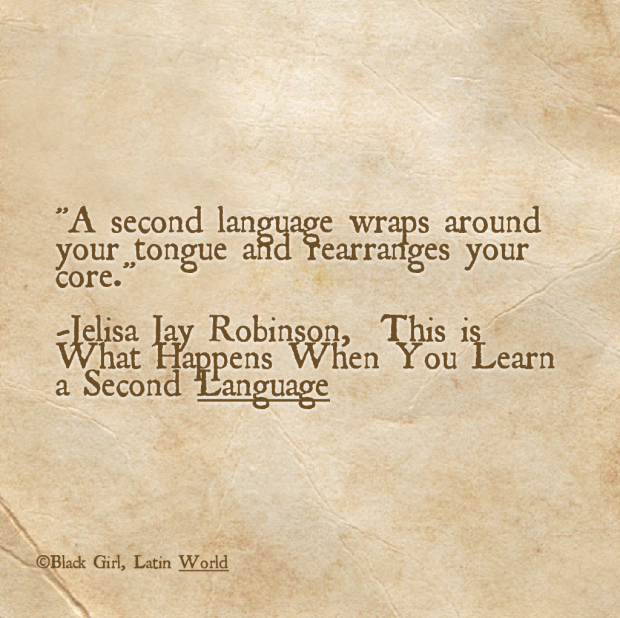
#MultilingualBlackPeople
A few months ago, I walked into a local Mexican restaurant. The waitress, named Felicia, asked for my friends Jorge and Juan’s order in Spanish. I was excited because when I go to Mexican restaurants, I usually get the opportunity to practice my second language. When Felicia gets to me, she asks in English “What can I get you?” I took no offense and gave her my order in Spanish. Her next words continued to be English.
I could feel my face getting hot. I was frustrated, embarrassed and if it weren’t for the fact that I didn’t drive there, I would have left then and there. Maybe that is me being over dramatic, but that is the way I felt at the time. What I wanted to say was “Adios Felicia”, but instead I ordered my torta. I get it. If you see a person that looks like me: Brown skinned, curly locs, it’s obvious that they only speak one language. English. Right? Jorge and Juan’s olive skin and straight Black hair read Spanish-speaking. This is Texas and the majority of folks who can rattle off at the mouth like Telenovela stars look nothing like me.
While I am not Afro-Latin@, I am aware that my experience with Felicia is very similar to many of my friends who identify as Latinegr@. The color of their skin and African features causes both non-Black Latin@s and African Americans to question their Latinidad. They are frequently responded to in English and asked “Why do you speak Spanish so well?” Many want to scream to the roof tops that they are Black and Latin@; both at once. Many people don’t know that Blackness, Latinidad and Africanness are important parts of Latin@ history, culture and experiences.
In the African American community, speaking Spanish results in questions that deal with essentializing Blackness. When I was working on a political campaign, there was another African American Spanish speaker and I overheard an African American colleague ask if he was a “real” Black person because he spoke Spanish so well. Since when does speaking Spanish make you less Black?
Let’s be honest, in Texas the amount of exposure to Afro-Latin@ history is low but steadily growing. Institutions like the University of Texas at Austin have been exploring Latinegr@ experiences through research, seminars and other forms of community engagement. Public figures like Houston Fox 26’s anchorman Jose Grinan and Houston-based poet Jasminne Mendez serve as great examples of people disrupting the narrative that Black always equals African American. There are also teachers like my colleague Olivia who taught a segment on Afro-Mexican history and my colleague Jorge, who informed his class about Celia Cruz. These experiences are needed in both our Black and Latin@ community based organizations, arts establishments and schools around Texas.
I am here for African Americans recognizing that this whole finding connections with diaspora, African American Spanish speaker thing is nothing new. African Americans have been using Spanish to connect, travel and survive since the 1900’s. Langston Hughes traveled to Cuba and Mexico and connected with Nicolás Guillén . Phylicia Rashad used her bilingual ability in her Cosby show audition. The man who inspired me to learn Spanish, my Dad, is an African American. It’s nothing new. It’s just not talked about.
As I write this piece with Tego Calderon playing in the background, I reflect on the conversations I have had with my Latinegr@ friends and recognize that ignorance of Afro-latinidad is rooted in the erasure of Afro-latinidad in our history books and imperial Blackness where the African American English speaking experience is held as the definition of Blackness. That’s why I love The Latinegr@s Project, Ain’t I Latina, Boriqua Chicks, African American Latino World and other spaces like these so much. They open our mind and allow us to see the stories of Blackness and Latinidad that we hardly see in the mainstream media.
We are a part of the diaspora. I hope we can continue to have more discussions on how Afro-American and Latinegr@ history is intertwined. I hope to see more Latinegr@s rising up and pushing for representation. More Afrodiaspora allies. More progress and roads to self-love. Let Spanish, Portuguese, English, Haitian Creole or any other language you speak roll off our tongue. Let our Blackness be what unites us.
The Spanish Speaking “African American” Part I
Follow Black Girl, Latin World on Facebook and Tumblr.
This piece is also published on the LatiNegr@s Project Website that I write for.








